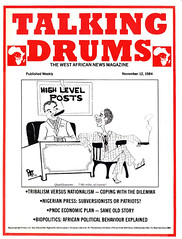What The Papers Say
National Concord, Nigeria
What tenure for permsecs?
The 11th ministerial meeting of the National Council of Establishments ended in Minna, Niger State, recently with a suggestion from Governor David Mark that the tenure of permanent secretaries at Federal and state levels should be limited to a period of five years.There was hardly a consensus of opinion during the meeting regarding Governor Mark's suggestion but the issue is nonetheless worthy of comment. In the opinion of the governor, what negates productivity in the public sector is the vantage point of the higher cadre in the civil service and that "inexplicably, when people rise to the pinnacle of their careers in the civil service, they relax." A far more convincing argument put forward by the governor was that the fate of top executives in the civil service ought to be tied up to the success or failure of the policies of their ministries.
Governor Mark's suggestion calls for a radical departure from established norms, traditions and regulations governing the civil service. But the call is neither entirely new nor is it without some merit. During the heated debate on the constitution in 1978, a lot of controversies were made out of the question of the role of the civil service under a presidential system. In particular, the question of whether in the new dispensation permanent secretaries should be treated as political appointees or not became quite contentious. The arguments advanced on the two sides of the issue are hard and well-known but at the end of the day, the positions of permanent secretaries became thoroughly politicised. Thus virtually all the governments we had in 1979 appointed party loyalists as permanent secretaries. Several of the appointees were drawn from outside the civil service in the same manner as commissioners and ministers.
Yet in spite of these and the compelling argument that only a politically-appointed permanent secretary could sufficiently appreciate the ideological imperatives of implementing a party's programme, the civil service hardly fits the cap of a partisan political outfit.
But there is even less reason now to treat permanent secretaries as political appointees. It is not correct, in our opinion, that the "vantage point" of the higher cadre of the civil service negates productivity because in organised systems, productivity is a function of whole. It would also be ridiculous to tie the tenure of permanent secretaries to the success or failure of their ministries, as Governor Mark would want, because civil servants are not policy makers. It is the responsibility of the political heads of the ministries to formulate policy and ensure its implementation, which is best done through political resolve.
It is ill-advised to isolate and subject the tenure of our permanent secretaries to a limit on purely untenable grounds. It may of course be useful to move top civil servants from one ministry to another as occasions may demand, but throwing them out of the service every five years could be unhelpful. Moreover, if they are so removed, how would that relate to the structure of the civil service.
If anything is suspected to be wanted in our civil service - and there are good grounds for suspicion - we should better approach the problem by re-examining the orientation of public service in this country rather than engage in shadow-chasing.
Daily Times, Nigeria
OPEC's kind gesture
It would amaze not a few observers that Nigeria was one of the two countries exempted from the recent oil cut-back by the Organisation of Petroleum Exporting Countries (OPEC). The prompting of such amazement might not be unconnected with the previous concessions which the OPEC has had to make to Nigeria.In July, when our country was desperately devising ways and means of tackling her enormous economic problems, she sought for and obtained increases in her oil output. The OPEC grant of 100,000 barrels per day (bpd) and 150,000 bpd in August and September went a long way to boost Nigeria's efforts in reviving her battered economy.
But Nigeria is not a pampered child of the OPEC. The OPEC is a responsive organisation ready to lend a sympathetic ear to the peculiar economic problems of its members and to offer practical assistance when the situation so demands.
That the members of OPEC agreed to exclude Nigeria and Iraq from bearing the brunt of the organisation's recent Geneva decision on the oil cut-back from 17.5 million bpd to 16 million bpd, was but another demonstration of the OPEC's responsiveness. Without doubt, the latest oil cut-back is aimed at the maintenance of OPEC's price structure and the stabilisation of the oil market.
We note with great satisfaction that the new kind gesture from the OPEC will further help Nigeria to tackle her economic problems. We praise the support given to our country by the OPEC member countries. We particularly thank Saudi Arabia, Kuwait, and Gabon for their robust support.
All said, members of our delegation led by the Minister of Petroleum and Energy, Prof Tam David-West, to the just concluded Geneva meeting, also demanded commendation for putting forward a powerful and persuasive argument to make other OPEC members see why out quota should not be cut. Indeed, Prof David- West's astute diplomacy in cultivating the friendship of his OPEC colleagues helped our cause a great deal.
However, the show of solidarity in the OPEC notwithstanding, the organisation should not lose sight of the unfaithfulness often exhibited by some of its members by their failure to adhere strictly to their allocated quotas. It is only by respecting the decision of OPEC by all its members can the organisation maintain its current prices, fortify its solidarity and put to shame those countries which would wish for the break-up of the cartel.
